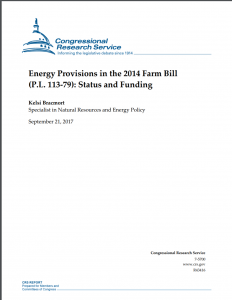Full Title: Energy Provisions in the 2014 Farm Bill (P.L. 113-79): Status and Funding
Author(s): Kelsi Bracmort
Publisher(s): Congressional Research Service
Publication Date: September 1, 2017
Full Text: Download Resource
Description (excerpt):
Title IX, the energy title of the 2014 farm bill (Agricultural Act of 2014; P.L. 113-79), contains authority for the energy programs administered by the U.S. Department of Agriculture (USDA). USDA energy programs have incentivized research, development, and adoption of renewable energy projects, including solar, wind, and anaerobic digesters. However, the primary focus of USDA energy programs has been to promote U.S. biofuels production and use—including corn starch-based ethanol (the predominant biofuel produced and consumed in the United States), cellulosic ethanol, and soybean-based biodiesel. The USDA energy programs via the farm bill are separate from the Renewable Fuel Standard (RFS) and tax incentives contained in separate energy and tax legislation.
Three farm bills have contained an energy title: the 2002 farm bill, the 2008 farm bill, and the 2014 farm bill. For all three farm bills, the major energy programs expire and lack baseline funding. The enacted 2014 farm bill extended most of the energy provisions of the 2008 farm bill with new funding authority, with the exception of the Rural Energy Self-Sufficiency Initiative, the Forest Biomass for Energy Program, the Biofuels Infrastructure Study, and the Renewable Fertilizer Study, which were either omitted or repealed. At issue for Congress is what oversight, programs, and initiatives, if any, an energy title under the forthcoming farm bill might support. The 2014 farm bill energy title provisions may be of interest during the upcoming farm bill debate, as Congress may decide to modify or reauthorize many of the programs.
The 2014 farm bill continued the attempt to refocus U.S. biofuels policy initiatives to favor noncorn feedstocks (e.g., cellulosic feedstocks). The most critical programs to this end are the Bioenergy Program for Advanced Biofuels, which pays producers for production of eligible advanced biofuels; the Biorefinery, Renewable Chemical, and Biobased Product Manufacturing Assistance Program (formerly Biorefinery Assistance Program), which assists in the development of new and emerging technologies for advanced biofuels; the Biomass Crop Assistance Program (BCAP), which assists farmers in developing nontraditional crops for use as feedstocks for the eventual production of cellulosic biofuels; and the Renewable Energy for America Program (REAP), which has funded a variety of biofuels-related projects. In addition, the 2014 farm bill included a new provision that precludes the use of REAP funding for any mechanism for dispensing energy at the retail level (e.g., blender pumps). Also, despite several amendments to the contrary, and its explicit exclusion from all financial support in the House-passed version of the 2014 farm bill (H.R. 2642), BCAP funding for the collection, harvest, storage, and transportation (CHST) component was retained in the 2014 farm bill. Finally, the 2014 farm bill added a new reporting requirement on energy use and efficiency at USDA facilities.
Over the five-year reauthorization period (FY2014-FY2018), the 2014 farm bill contained a total of $694 million in new mandatory funding and authorizes discretionary funding (i.e., subject to annual appropriations) of $765 million for the various farm bill renewable energy programs. This is a significant reduction from the 2008 farm bill, which had authorized slightly over $1 billion in mandatory funding over the five-year period of FY2008-FY2012, along with $1.7 billion in discretionary appropriations to Title IX energy programs. The mandatory funding has been the primary support for these programs, as appropriators have not provided funding for most of the discretionary authorizations
